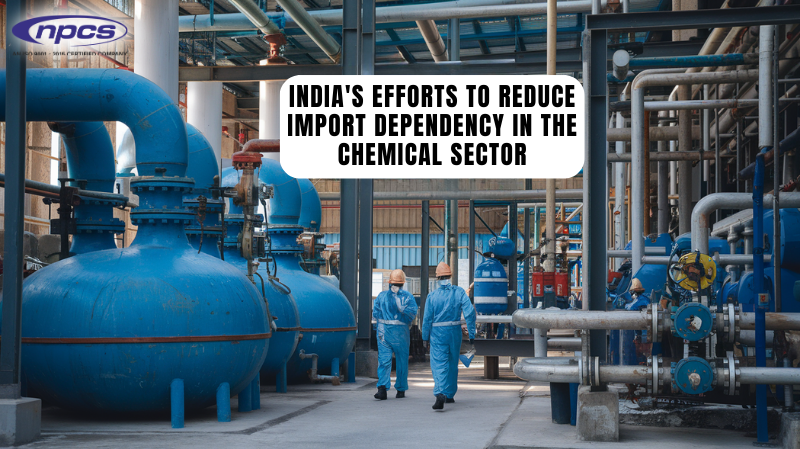India is making all its efforts to become an import-free nation in chemical and petrochemical products. This is because, even in the area of global competition, the country views the chemical industry as a strategic sector that not only supports investment but also promotes initiatives for attracting investment in research and local production. The purpose of these endeavors is to make India a self-educated nation in the field of chemistry and its all products whilst creating more jobs.
Vision 2024: A Blueprint for Growth
The Indian government’s Department of Chemicals and Petrochemicals has laid out an ambitious Vision 2024 statement that sets clear objectives for the sector. This forward looking vision wants to:
- Elevate India to the status of one of the preeminent global chemical and petrochemical manufacturing locations
- Develop domestic supply to minimize imports.
- Invest in manufacturing products of superior quality that can compete internationally
- Adopt the use of modern technologies for improving the operations within the sector
- Set-up purpose built industries in order to increase the levels of manufacturing.
- Ensure that sustainability is treated as an imperative in a bid to meet international environmental best practices and give back a reasonable amount to the local industries.
This Vision 2024 blueprint provides a way forward for the reasons for its the intent is more conventional and its vertical has an objective of the strategy. The strategy targets the growing demand within the country and seeks to also bridge the import-export imbalance with respect to raw materials and finished goods so as to make India self-sufficient in all essential raw materials and products.
Join With Us
Petroleum, Chemical, and Petrochemical Investment Regions (PCPIRs)
Central to this restructuring process is the establishment of Petroleum, Chemical and Petrochemical Investment Regions (PCPIR). The government has announced that development of such integrated industrial complexes is underway in chemical and petrochemical sectors in four states – Gujarat, Andhra Pradesh, Odisha, and Tamil Nadu. Full utilization of these regions is anticipated to induce crazily around Rs. 7.63 lakh crore in investments and employ over 33 lakh individuals.
These PCPIRs have infrastructure facilities and logistics in place plus a policy that favors industries. The integration of these clusters creates structural advantages for different players in the value chain, promoting efficient manufacturing techniques and facilitating cross-company technology transfer. With the help of creating such space for domestic players, the PCPIRs will likely lessen to a significant extent the import of petrochemicals and the products of petrochemicals in India.
The Plastic Parks Scheme: Catalyzing Domestic Production
Another remarkable initiative concerns the Plastic Parks Scheme, which aims to enhance the verticals of the plastics processing industry that are present beyond the primary stages. This scheme encourages the setting up of industrial estates for plastic processing as well as manufacturing, and so far the government has sanctioned the establishment of ten plastic parks in different states.
These Trusts come with modern infrastructure and also offer investment freights for investors. The scheme facilitates Indirect Internal Investment in the form of grants of up to 50 percent of project cost with an upper limit of Rs 40 crores per project. This initiative aims to increase local plastic manufacturing, foster creativity and cut down on the operational costs of plastic processing plants in India such that Indian plastic products stand a better chance in the international market.
Furthermore, the establishment of plastic parks seeks to help cut down the country’s reliance on plastic raw materials and finished goods from abroad enabling the country to achieve self-sufficiency in plastic products manufacturing.
Centers of Excellence in Polymer Technology: Fostering Innovation
On the one hand, the government understands that the chemical sector development will be spurred by science and technology, so it is creating research centers. To support its innovation agenda, the government has set up 13 Centers of Excellence in Polymer Technology at topclass institutes across the country. The centers aim to construct new functionalities of polymer and plastics, modernize the existing petrochemical processes, and promote local research developments.
It is important to note that the Centers of Excellence will be of critical importance to the polymer and petrochemical based innovations in the country. By encouraging research that targets the domestic market, such centers will limit the use of foreign technologies and foster the birth of products that are “Made in India”.
Petrochemicals Research & Innovation Commendation Scheme: Encouraging Excellence
Further, the resilience and commitment of the government to advance Research and Technological development is well amplified in such initiatives like the Petrochemicals Research & Innovation Commendation Scheme. The purpose of this scheme is to encourage petrochemical research and innovation that is exceptional and offers incentives for new developments within the field.
The aim of this scheme is to make research more competitive in sectors, sustainable chemistry, green technologies, advanced manufacturing processes, thereby giving Indian companies the much-needed technological edge to compete globally. The scheme is meant to bring in an integration of all the components of academia, industry, and government for creating new knowledge within the country.
Visit this Page for More Information: Start a Business in Petroleum Industry
Production Linked Incentive (PLI) Scheme for Chemicals
In addition to the above, the Production Linked Incentive (PLI) Scheme for the chemical sector significantly bolsters India’s campaign for Atmanirbhar Bharat. Although the Vision 2024 document does not explicitly state it, the PLI scheme aims to encourage domestic production in several critical sectors, including chemicals, by offering financial benefits.
Under this scheme, companies earn rewards based on a threshold base production level, which usually refers to the production level they achieved in a previous year. The PLI scheme is expected to draw investments from both within the country and abroad in the chemical sector due to its economic potential. It will also enhance local production capabilities and lower import levels. The government has successfully used it in various economic sectors such as electronics, drugs, and automobiles, and is now applying it in the chemical sector.
Import Substitution and Sustainability
There is huge dependence on imports pertaining to the chemical sector in India, primarily on account of raw materials and specialty chemicals. However, with present circumstances and the positive factors at the back of the government, the country is moving towards self-sufficiency and reducing the imports which will help control the import expenses and encourage the country’s own production.
In addition, concern for sustainable resource use has been and still is, the focus of India’s chemical policy. The government has been supporting green chemistry and the use of eco-friendly manufacturing technologies. Experts expect that new investments in the sector will not only aim at increasing output but also invest in improving processes and adopting practices that minimize the ecological impact in line with the global environmental standards.
Conclusion: A Future Ready for Global Leadership
The Indian chemical and petrochemical sector is on the brink of a transformational shift. The Indian government is putting various strategies in place to encourage the domestic industries through comprehensive measures such as: generation of PCPIRs, the Plastic Parks Scheme, setting up of Centers of Excellence and Implementation of PLI scheme. These measures aim to enhance the investment climate in the sector to reduce import dependence, attract investments, and promote innovation and growth more efficiently.
As these activities gain momentum, they will likely improve India’s production capability significantly, make the country independent of essential chemical product imports, and transform India into a manufacturing nation. The positive outcomes of these policies will not only flow to the local economy but will also raise the profile of India in the global chemical industry as an important source in the international supply chain. Thanks to robust policy framework and smart investments, India is on track to realizing the ambitious Vision 2024 targets and even more.






